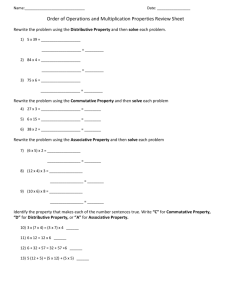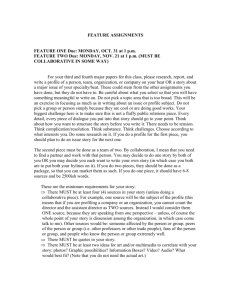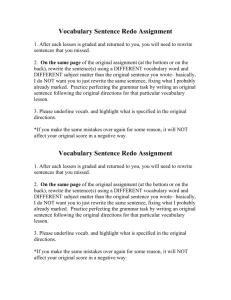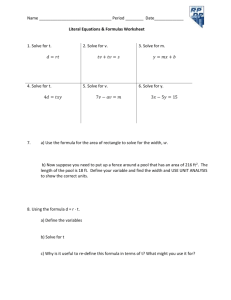Module_05_Rewrite _and_Responder
advertisement
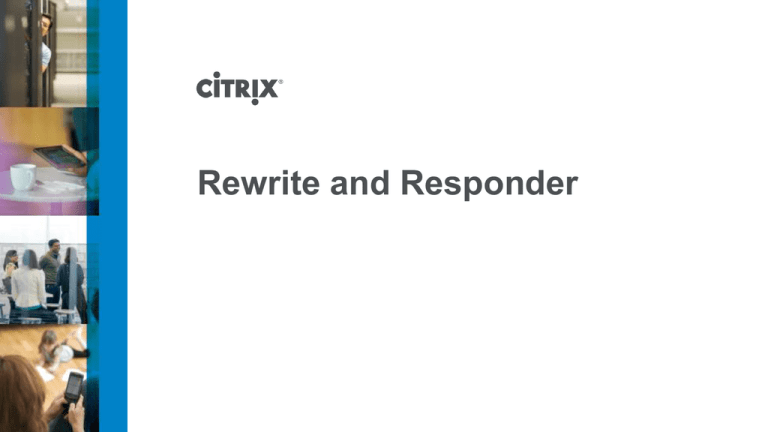
Rewrite and Responder Responder • Provides a mechanism to create a response based purely on a request • Is used to send a redirect to a URL or send a response to a client • Can be used to craft error pages based on security policies • Is configured using the responder Sub-Node under the Protection Features node in the Configuration Utility © 2012 Citrix | Confidential – Do Not Distribute Rewrite • Provides a mechanism to rewrite request and response URLs and HTTP Headers and Body • Allows control of server side behavior by inserting headers in the requests • Is configured using the Rewrite node in the configuration utility © 2012 Citrix | Confidential – Do Not Distribute Rewrite • Rewrite provides two modes, rewriting requests and rewriting responses • Can detect response errors, and provide alternate content, such as a pretty error page on 500 errors • Allows control of server side behavior by inserting headers in the requests • Can rewrite inbound URLs and POST body content from a client • Limited support for rewriting response body data © 2012 Citrix | Confidential – Do Not Distribute Flow Processing Order Flow Processing Client Implications of Processing Order • Any responder response bypasses all other HTTP processing • Request rewrite policies cannot impact other basic functions • Response rewrite policies can impact the integrated caching and application firewall functions Caching App FW AppFW body transformer Responder Apply Rewrite/ other Edits Caching Response Rewrite Content Switching CF+CMP+ CKA, etc LB CF+HDOSP SC+PQ Request Rewrite Server © 2012 Citrix | Confidential – Do Not Distribute Understanding the URL Rewrite Process Browser Request The client’s browser sends a request to the web server through the NetScaler system. Check for Policies The NetScaler system checks the request time policy bank for applicable policies. Rewriting The NetScaler system builds a set of actions to apply after evaluating the list of prioritized policies. © 2012 Citrix | Confidential – Do Not Distribute The NetScaler system builds a set of actions to apply after evaluating the list of prioritized policies. Rewriting The NetScaler system rewrites the response and forwards it to the client’s browser. Evaluation Evaluation The NetScaler system rewrites the request and forwards it to the web server. Check for Policies The NetScaler system checks the response time policy bank for applicable policies. Server Response The web server receives the request and sends a response. Understanding the Responder Process Browser Request The client’s browser sends a request to the web server to the NetScaler system. Check for Policies The NetScaler system checks the request time policy bank for applicable policies. Evaluation The NetScaler system builds a set of actions to apply after evaluating the list of prioritized policies. Response The NetScaler system Responds to the client request with either a redirect or respondwith. © 2012 Citrix | Confidential – Do Not Distribute Policies Configuring Rewrite or Responder An administrator can use the following process to configure rewrite or responder: • Step 1: Define an action to be performed • Step 2: Create a policy • Step 3: Bind this policy (rule + action) to a bind point to perform rewrite © 2012 Citrix | Confidential – Do Not Distribute Rewrite Actions An administrator can type the following command in the CLI to add a rewrite action: add rewrite action name type target [string] ᵒ Name = The name of the action ᵒ Type = The type of action ᵒ Target = The value of the target will vary depending on the type ᵒ String = An expression that defines exactly what is to be done with the target © 2012 Citrix | Confidential – Do Not Distribute Responder Actions An administrator can use the following command syntax to configure responder actions: add responder action name type target ᵒ Name = the name of the action ᵒ Type = the type of action ᵒ Target = the content to respond with © 2012 Citrix | Confidential – Do Not Distribute Basic Configuration Action Configuration • Actions provide the basis of what is to be done when a policy evaluated to be true • There are several built-in actions: Rewrite Responder • For both the rewrite and responder, to add an action the general format is • add responder action <name> <type> <APE Expression> add rewrite action <name> <type> <APE Expression> • The types of actions are dependent on what needs to be done © 2012 Citrix | Confidential – Do Not Distribute Basic Configuration Policy Configuration • Before any action is performed on a request or response, a policy needs to be designed that matches a request or response • The language for specifying the condition is the Advance Policy Engine (APE), described separately • Policies are added through one of two commands (depending on need) ᵒ add rewrite policy <name> <rule> <action> ᵒ add responder policy <name> <rule> <action> © 2012 Citrix | Confidential – Do Not Distribute Basic Configuration Policy Bindings • Once an action and policy are created, the policy needs to be bound to a “label” or “bank” which dictates the order of processing • Pre-defined labels are “global” and “vserver” • To bind to the default label with default options: bind responder global <name> <priority> bind rewrite global <name> <priority> • Example syntax to bind to a vserver label instead: bind responder vserver <vsvr name> <policy> <priority> bind rewrite vserver <vsvr name> <policy> <priority> © 2012 Citrix | Confidential – Do Not Distribute Rewrite and Responder Actions Responder • redirect Create a redirect action • respondwith Create a full response for the request Rewrite • insert_http_header Appends a new HTTP header • delete_http_header Delete an HTTP header completely • delete(_all) Delete the text found (once) • replace(_all) Replaces (exactly) one string with another • insert_before(_all) Inserts a string before another string • insert_after(_all) Insert a string after the found string • replace_http_res Replaces one HTTP response with another © 2012 Citrix | Confidential – Do Not Distribute Rewrite Examples Rewrite – Important commands > help add rewrite policy Usage: add rewrite policy <name> <rule> <action> [<undefAction>] where: <rule> = <expression> > help add rewrite action Usage: add rewrite action <name> <type> <target> [<stringBuilderExpr>] [-bypassSafetyCheck ( YES | NO )] where: <type> = ( delete | insert_http_header | delete_http_header | insert_before | insert_after | replace ) > help set rewrite param Usage: set rewrite param -undefAction <string> © 2012 Citrix | Confidential – Do Not Distribute Rewrite – Useful Commands/Tips • Rewrite can do the following ᵒ ᵒ ᵒ ᵒ Modify the URL of a request Modify the Cookie content Insert, modify or delete an HTTP request/ response header String manipulation (insert, delete, replace, append etc) © 2012 Citrix | Confidential – Do Not Distribute Configuring Rewrite • Step 1: Define an action to be performed • Step 2: Create a policy ᵒ Define the rule which determine when to apply action ᵒ Attach the action for the outcome of the evaluation • Step 3: Bind this policy (rule + action) to a bind point perform rewrite ᵒ Priorities should be attached to a policy, which determine sequence of policy execution ᵒ Next policy to be evaluated can be mentioned using goto expression ᵒ Invoke a rewrite policy label or vserver bound policies © 2012 Citrix | Confidential – Do Not Distribute Rewrite Actions • add rewrite action <name> < type> <target> [<string>] ᵒ ᵒ ᵒ ᵒ <name> name of the action <type> type of action <target> The value of the target will vary depending on the type <string> an expression that defines exactly what is to be done with the target. © 2012 Citrix | Confidential – Do Not Distribute INSERT_HTTP_HEADER <type> INSERT_HTTP_HEADER <target> Header name [<stringBuilderExpr>] Header value add rewrite action act_insert INSERT_HTTP_HEADER Client_ip ‘CLIENT.IP.SRC’ GET /foo.html HTTP/1.1 Host: site.com Connection: close © 2012 Citrix | Confidential – Do Not Distribute GET /foo.html HTTP/1.1 Host: site.com Connection: close Client_ip: 10.102.32.100 DELETE_HTTP_HEADER <type> DELETE_HTTP_HEADER <target> [<stringBuilderExpr>] Header Name add rewrite action delete_http_cookie DELETE_HTTP_HEADER Cookie GET /foo.html HTTP/1.1 Cookie: a=b Connection: close Cookie: c=d <type> DELETE_HTTP_HEADER GET /foo.html HTTP/1.1 Connection: close <target> [<stringBuilderExpr>] Header name add rewrite action act_delete_header DELETE_HTTP_HEADER Host GET /foo.html HTTP/1.1 Host: site.com Connection: close © 2012 Citrix | Confidential – Do Not Distribute GET /foo.html HTTP/1.1 Connection: close REPLACE <type> REPLACE <target> Text reference [<stringBuilderExpr>] Expression add rewrite action act_replace REPLACE “HTTP.REQ.URL.PATH.GET(1)" "\"citrix\"" GET /netscaler/foo.html HTTP/1.1 Host: netscaler.com Connection: close GET /citrix/foo.html HTTP/1.1 Host: netscaler.com Connection: close add rewrite action retry_request replace_http_res "\"HTTP/1.1 302 Temporary Redirect\\r\\nLocation: http://www.cnn.com/\\r\\n\\r\\n\"" © 2012 Citrix | Confidential – Do Not Distribute INSERT_BEFORE <type> INSERT_BEFORE <target> Text reference [<stringBuilderExpr>] Expression add rewrite action act_before INSERT_BEFORE “HTTP.REQ.HEADER(\"host\").VALUE(0)" "\"india\"" GET /foo.html HTTP/1.1 Host: site.com Connection: close © 2012 Citrix | Confidential – Do Not Distribute GET /foo.html HTTP/1.1 Host: indiasite.com Connection: close INSERT_AFTER <type> INSERT_AFTER <target> Text reference [<stringBuilderExpr>] Expression add rewrite action act_after INSERT_AFTER “HTTP.REQ.HEADER(\"host\").VALUE(0).TYPECAST_LIST_T(‘.’).GET(0)" "\"-india\"" GET /foo.html HTTP/1.1 Host: site.com Connection: close © 2012 Citrix | Confidential – Do Not Distribute GET /foo.html HTTP/1.1 Host: site-india.com Connection: close DELETE <type> DELETE <target> [<stringBuilderExpr>] Text reference add rewrite action act_delete DELETE “HTTP.REQ.HEADER("\host\").VALUE(0)" GET /foo.html HTTP/1.1 Host: site.com Connection: close © 2012 Citrix | Confidential – Do Not Distribute GET /foo.html HTTP/1.1 Host: Connection: close Built in actions • NOREWRITE – Do not perform rewrite • RESET – Reset the current client and server connections • UndefAction – If expression evaluation results in an undefined state, UndefAction is used ᵒ UndefAction can be specified per policy ᵒ If per policy UndefAction isn’t specified, the global UndefAction is applied ᵒ NOREWRITE and RESET are the only valid undef actions © 2012 Citrix | Confidential – Do Not Distribute Creating Rewrite Policies • add rewrite policy <policyName> <rule> <action> [<undefAction>] ᵒ ᵒ ᵒ <action> is rewrite action name or NOREWRITE or RESET <undefAction> is NOREWRITE or RESET <rule> is a policy evaluation rule that returns a boolean result • Example: ᵒ add rewrite policy pol_host ‘!HTTP.REQ.HEADER(“Host”).EXISTS’ RESET © 2012 Citrix | Confidential – Do Not Distribute Bind points • Vserver bind points: ᵒ Rewrite policies can be bound to cs and lb vservers • Global bind points: • Override: Policies bound to this label are evaluated before vserver specific evaluation. • Default: Policies bound to this label are evaluated after vserver specific evaluation • Custom bind points ᵒ Policy labels: user can create and bind policies to these bind points ᵒ Policies bound will be evaluated only on invoke ᵒ Will not be evaluated if not invoked • Invoking bind points ᵒ Similar to a named subroutine ᵒ Can be invoked by policies ᵒ Global bind points not invokeable © 2012 Citrix | Confidential – Do Not Distribute Rewrite Evaluation Process Next Bank/ Invoke Rewrite bind points Bind point Selector After processing all bind points Order of bind point evaluation: -Override -All active vservers (cs followed by lb) -Default © 2012 Citrix | Confidential – Do Not Distribute Selected Bank Perform Rewrite Actions Policy Evaluator END Undefined Perform the rule-specific or global undefAction Binding Policies bind rewrite global <policyName> <priority> [<gotoPriorityExpression>] [-type <type>] [invoke (<labelType> <labelName>) ] bind rewrite policylabel <labelName> <policyName> <priority> [<gotoPriorityExpression>] [-invoke (<labelType> <labelName>) ] bind rewrite vserver <vServerName> <policyName> <priority> [<gotoPriorityExpression>] -type ( REQUEST | RESPONSE ) [-invoke (<labelType> <labelName>) ] <priority> is a positive integer constant ᵒ Lower value means higher priority ᵒ Within each bind point duplicate priorities not allowed <gotoPriorityExpression> ᵒ END: terminate policy evaluation and proceed to apply action ᵒ NEXT: proceed to the next policy in the priority ranking ᵒ Positive integer: proceed to policy with the priority ranking as specified ᵒ Advanced expressions can be used to configure © 2012 Citrix | Confidential – Do Not Distribute Binding policies (continued) <type> ᵒ indicates the type of global bind point ᵒ REQ_OVERRIDE | REQ_DEFAULT | RES_OVERRIDE | RES_DEFAULT <labelType> ᵒ indicates the label type that needs to be invoked <labelName> ᵒ indicates the name of vserver if <labelType> is (reqvserver | resvserver) ᵒ indicates the name of policylabel if <labelType> is policylabel ᵒ CURRENT: can be used with <labelType> (reqvserver | resvserver) and would cause all the active vserver bound policy to be evaluated © 2012 Citrix | Confidential – Do Not Distribute Rewrite Case Study Redirect to alternate 404 content • Requirement: A customer (a bank) needed to direct 404 response customers (i.e. page not available) to a customized error page. • Solution: Use URL rewrite to replace 404 response headers with the 302 redirect response mentioning the location of the alternate page. © 2012 Citrix | Confidential – Do Not Distribute Redirect to alternate 404 Commands: • add rewrite action 404_rewrite_action replace_http_res "\"HTTP/1.1 302 Temporary Redirect\nLocation: http://10.10.10.1/my404.html \n\"" • add rewrite policy 404_Rewrite_Policy 'HTTP.RES.STATUS.EQ(404)' 404_Rewrite_Action • bind rewrite global 404_Rewrite_Policy 1 © 2012 Citrix | Confidential – Do Not Distribute Case Study: Mitigating Compression You don't want to receive compressed content because: • Need to inject HTML into content received • Don’t want to cache compressed content © 2012 Citrix | Confidential – Do Not Distribute Mitigating Compression Commands: • add rewrite action "remove-ae" delete_http_header "Accept-Encoding" • add rewrite policy "remove-ae" true "remove-ae" • bind lb vserver my_test_vsvr -policyName "remove-ae" -priority 10 gotoPriorityExpression NEXT -type REQUEST © 2012 Citrix | Confidential – Do Not Distribute Mitigating HTTP Chunking What is chunking and why… • HTTP 1.1 supports chunked encoding, which allows HTTP messages to be broken up into several parts. Chunking is most often used by the server for responses, but clients can also chunk large requests. • Chunking Header: Transfer-Encoding • Not possible in HTTP 1.0 © 2012 Citrix | Confidential – Do Not Distribute Mitigating HTTP Chunking • add rewrite action downgrade_1.0 replace http.req.version "\"HTTP/1.0\"" • add rewrite policy to_1.0 true downgrade_1.0 • bind lb vserver test_vsvr -policyName to_1.0 -priority 20 gotoPriorityExpression NEXT -type REQUEST © 2012 Citrix | Confidential – Do Not Distribute Typecasting HTTP Data Streams • Typecasting is used to convert the HTTP data stream • Typecasting can: ᵒ ᵒ ᵒ ᵒ Include structured text Recognize a string as an integer value Recognize a string as a URL Take the query part of the URL and check for the ‘&’ delimiter and put each argument in a list ᵒ Recognize the string presented as a time value © 2012 Citrix | Confidential – Do Not Distribute In Depth Rewrite, Responders and URL Transformation Rewrite: The NetScaler system rewrites HTTP headers Responder: The NetScaler system responds based on the request URL transformation: The NetScaler system translates internal and external URLs © 2012 Citrix | Confidential – Do Not Distribute Rewrite Process © 2012 Citrix | Confidential – Do Not Distribute Responder Process © 2012 Citrix | Confidential – Do Not Distribute URL Transformation © 2012 Citrix | Confidential – Do Not Distribute LAB – Module 5 – Exercise 1,2,3 To continue with the lab, browse to: http://training.mycitrixcloud.net/geoilt Enter you business email and this session code: NETSCALER-WORKSHOP © 2012 Citrix | Confidential – Do Not Distribute Work better. Live better.

